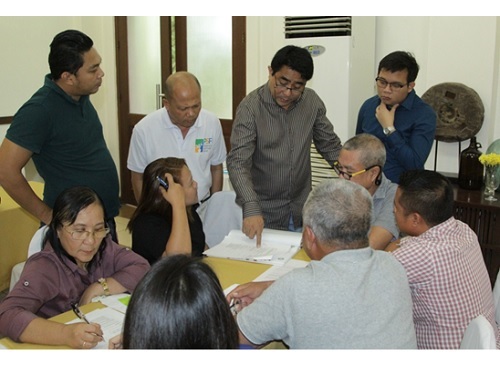MANILA, July 17, 2019 — More local governments will receive training on local climate change action planning this year, the Climate Change Commission (CCC) reveals today as the Pre-SONA forum concludes in Davao City.
This year’s rollout of the Communities for Resilience or CORE Modular Training Program for local government units (LGUs) will commence in August. “It’s a good time to resume training LGUs following the assumption of newly elected local officials many of whom demonstrate a strong resolve to pursue climate action and environmental protection,” Climate Change Secretary Emmanuel M. De Guzman said.
More than 80 LGUs are expected to benefit from the training and to deliver enhanced Local Climate Change Action Plans (LCCAPs) which the Climate Change Act of 2009 asks of every LGU.
Based on Department of the Interior and Local Government’s latest count, 1073 LGUs now have LCCAPs, a hundred fold increase from 137 in 2015. “There is greater awareness now among local authorities on the importance of LCCAP in ensuring community resilience to climate change and sustainability of local investments,” said CCC Strategic Partnership Division Chief Alexis Lapiz.
CCC and DILG are set to issue this year a joint memorandum circular to LGUs on establishing the quality assurance review system for LCCAP.
This year’s first wave of CORE training in August will benefit all LGUs in Yolanda Corridor. The second wave will assist vulnerable coastal municipalities in Luzon in September, while the last wave shall help muslim and indigenous peoples communities in Mindanao in October.
“We give preferential attention to the new poor in Yolanda Corridor, coastal communities more vulnerable to rising sea level and salt water intrusion, and indigenous peoples whose resilience to extreme weather events are compromised by weak and vulnerable livelihoods,” De Guzman said on the priority target areas for this year’s CORE rollout.
Since the launch of its CORE Program in 2016, CCC has trained 124 LGUs on enhancing LCCAPs and 133 faculty members from state universities and colleges across the country on standard modules for mentoring local planners. They include modules on climate and disaster risk assessment, greenhouse gas accounting, climate budget tagging, and PSF project proposal development. CORE trainings are expected to be in full swing next year to cover the rest of the country.
“Networking state universities and colleges and higher education institutions is key to the sustainability of CORE as a capacity building program for LGUs. This is why we are forming multi-stakeholder consortiums among NGAs, SUCs, private universities, and research institutes.” De Guzman said. “This way, we strengthen the cooperation between national and local governments and the science and academic community on mainstreaming climate change adaptation and mitigation in local development planning,” he added.
“As we celebrate in October our 10th year anniversary as an institution, CCC endeavors to present more knowledge and learning exchange platforms for our LGUs so they can readily apply adaptation solutions and good practices and strengthen the resilience of our communities which are at the forefront of climate change impacts,” De Guzman said.
To sustain peer-to-peer learning among LGUs on climate change adaptation and mitigation and disaster resilience, CCC and DILG are jointly holding the 3rd National Convention on Climate Change and Disaster Risk Reduction during the national observance of the Climate Change Consciousness Week in November.

